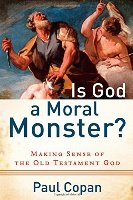A Book Summary from Books At a Glance
About the Author
Paul Copan is the Pledger Family Chair of Philosophy and Ethics at Palm Beach Atlantic University in Florida. He is the author or editor of many books on apologetics and philosophy.
Introduction
One of the most strident charges of the New Atheists is that the depiction of God in the Old Testament makes him out to be an immoral, blood-thirsty, horrible, petty and provincial deity. Even many Christians struggle to understand some of the Old Testament laws, as well as God’s commands to destroy the Canaanites. In this book Copan squarely faces the most difficult challenges of Old Testament ethics and demonstrates that God is not a moral monster. He pays careful attention to the context and background of troubling passages, as well as observing how the Old Testament law was not a universal, timeless statement of perfect ethics, but rather a way of moving people to a higher ethical standard than they had held before, as well as preparing them for the perfect ethical teachings of Jesus Christ.
Table of Contents
Introduction
Part 1: Neo-Atheism
Chapter 1 Who Are the New Atheists?
Chapter 2 The New Atheists and the Old Testament God
Part 2: God: Gracious Master or Moral Monster?
Chapter 3 Great Appetite for Praise and Sacrifices?
Divine Arrogance or Humility?
Chapter 4 Monumental Rage and Kinglike Jealousy?
Understanding the Covenant-Making God
Chapter 5 Child Abuse and Bullying?
God’s Ways and the Binding of Isaac
Part 3: Life in the Ancient Near East and in Israel
Chapter 6 God’s Timeless Wisdom?
Incremental Steps for Hardened Hearts
Chapter 7 The Bible’s Ubiquitous Weirdness?
Kosher Foods, Kooky Laws? (I)
Chapter 8 The Bible’s Ubiquitous Weirdness?
Kosher Foods, Kooky Laws? (II)
Chapter 9 Barbarisms, Crude Laws, and Other Imaginary Crimes?
Punishments and Other Harsh Realities in Perspective
Chapter 10 Misogynistic?
Women in Israel
Chapter 11 Bride-Price? Polygamy, Concubinage, and Other Such Questions
Chapter 12 Warrant for Trafficking Humans as Farm Equipment
(I): Slavery in Israel
Chapter 13 Warrant for Trafficking Humans as Farm Equipment
(II): Challenging Texts for Slavery
Chapter 14 Warrant for Trafficking Humans as Farm Equipment
(III): Slavery in the New Testament
Chapter 15 Indiscriminate Massacre and Ethnic Cleansing?
The Killing of the Canaanites (I)
Chapter 16 Indiscriminate Massacre and Ethnic Cleansing?
The Killing of the Canaanites (II)
Chapter 17 Indiscriminate Massacre and Ethnic Cleansing?
The Killing of the Canaanites (III)
Chapter 18 The Root of All Evil?
Does Religion Cause Violence?
Part 4: Sharpening the Moral Focus
Chapter 19 Morality without a Lawgiving God?
The Divine Foundation of Goodness
Chapter 20 We Have Moved beyond This God (Haven’t We?):
Jesus as the Fulfiller of the Old Testament
Discussion/Study Questions
Notes
Summary
Part 1:
Neo-Atheism
Chapter 1
Who Are the New Atheists?
Chapter 2
The New Atheists and the Old Testament God
Atheists have existed since ancient times, and the percentage of self-proclaimed atheists in the United States has not gone up since the advent of the New Atheists. The New Atheists are characterized by passionate zeal and heat in their arguments, even though they claim to be scientific and rational. Despite their claims, their arguments have been recognized by experts — both Christians and atheists — as being extraordinarily weak. They also refuse to acknowledge that atheism has been responsible for certain global atrocities, while refusing to give Christianity any credit for doing anything good in human history.
Although many writers have provided responses to the New Atheists, there is more work to be done in answering their charges against the morality of God in the Old Testament. Their rhetoric is very pointed as they cite….
[To continue reading this summary, please see below....]
The remainder of this article is premium content. Become a member to continue reading.
Already have an account? Sign In
